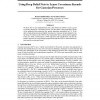Free Online Productivity Tools
i2Speak
i2Symbol
i2OCR
iTex2Img
iWeb2Print
iWeb2Shot
i2Type
iPdf2Split
iPdf2Merge
i2Bopomofo
i2Arabic
i2Style
i2Image
i2PDF
iLatex2Rtf
Sci2ools
NIPS
2007
2007
Using Deep Belief Nets to Learn Covariance Kernels for Gaussian Processes
We show how to use unlabeled data and a deep belief net (DBN) to learn a good covariance kernel for a Gaussian process. We first learn a deep generative model of the unlabeled data using the fast, greedy algorithm introduced by [7]. If the data is high-dimensional and highly-structured, a Gaussian kernel applied to the top layer of features in the DBN works much better than a similar kernel applied to the raw input. Performance at both regression and classification can then be further improved by using backpropagation through the DBN to discriminatively fine-tune the covariance kernel.
| Added | 30 Oct 2010 |
| Updated | 30 Oct 2010 |
| Type | Conference |
| Year | 2007 |
| Where | NIPS |
| Authors | Ruslan Salakhutdinov, Geoffrey E. Hinton |
Comments (0)

